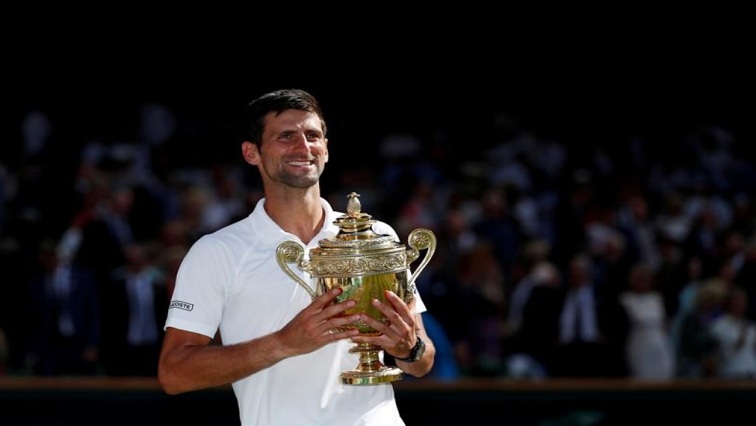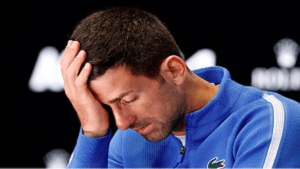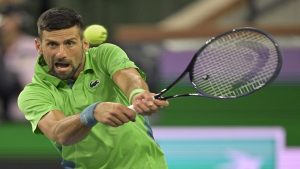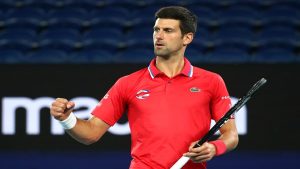Young German Alexander Zverev’s breakthrough title at the ATP Finals in London last month brought the future into focus but the year ended with men’s tennis in the grip of a block of 30 somethings led by a resurgent Novak Djokovic.
Serbian Djokovic, 31, needed elbow surgery in February to cure a problem that surfaced in 2017, but after some jarring defeats he returned to the kind of domination he achieved in 2015, winning Wimbledon and the U.S. Open.
Roger Federer continued to hold back the clock as only he can by winning the Australian Open, aged 36 and a few weeks later became the ATP’s oldest world number one.
Rafael Nadal, 32, had an injury-hit year but that did not stop the Spaniard winning an 11th French Open title.
By the time the long season wrapped up, Djokovic, Nadal and Federer were one, two and three in the ATP rankings with seven of the top 10 aged 30 or over.
The eagerly-awaited return of Serena Williams to the women’s game after giving birth to daughter Alexis Olympia last September failed to deliver the American a record-equalling 24th Grand Slam singles title, although she was tantalisingly close.
It is not the majestic tennis she played en route to the Wimbledon and U.S. Open finals that will be remembered, however, but her controversial Flushing Meadows showdown against Japan’s Naomi Osaka and the ensuing fall-out and allegations of sexism.
In one of the most infamous matches played in the New York cauldron, Williams raged after being given a code violation for ‘off-court coaching’ in the second set, got a point penalty for angrily smashing a racket and was docked a game for calling umpire Carlos Ramos a “liar”.
Osaka, who has since turned 21, somehow stayed calm in the bedlam to beat her childhood idol, but was reduced to tears as the crowd booed during the post-match presentations — angry at the perceived unfair treatment of the queen of women’s tennis.
Patience paid off for two of the WTA’s ultimate battlers.
Denmark’s Caroline Wozniacki beat Simona Halep on an oven-like Rod Laver Arena to win the Australian Open and claim her first Grand Slam title, at the 43rd attempt.
A few months later Halep became the first Romanian to win a Grand Slam title for 40 years as she beat American Sloane Stephens at Roland Garros.
‘COULDN’T BREATHE’
She had lost her previous three finals, including the year before in Paris from a winning position, but after losing the first set against Stephens roared back to claim the most popular victory of the year.
“In the last game I couldn’t breathe, I just didn’t want to repeat what happened the other years,” Halep, who finished 2018 as world number one, said.
Germany’s Angelique Kerber ripped up the script at Wimbledon. Serena Williams had looked unstoppable during a blazing fortnight on the All England Club lawns and was odds-on to claim an eighth singles title, equal Margaret Court’s 24 slams and become the first mum to win Wimbledon for 38 years.
With support in the Royal Box from friend Meghan Markle, wife of Britain’s Prince Harry, the stage was set for Serena but an inspired Kerber dropped just six games to become the first German woman to win the title since Steffi Graf in 1996.
That final was controversially played after the conclusion of the men’s semi between Djokovic and Nadal, itself delayed by South African Kevin Anderson’s epic, six-hour-36-minute defeat of American John Isner, 26-24 in the deciding set.
Djokovic took brutal advantage of a fatigued Anderson in the final and later in the year Wimbledon called time on “never-ending” matches as they announced that from 2019 onwards tiebreaks would be played at 12-12 in the decider.
Wimbledon lit the blue touch-paper for Djokovic who had entered the Championships seeded 12 after slipping to his lowest ranking since 2006.
After ending a two-year Grand Slam drought he went 28-3 for the rest of the year, including winning 16 consecutive sets to march to the U.S. Open title where he beat Argentina’s Juan Martin del Potro in the final.
That took him level on 14 Grand Slams with Pete Sampras and hunting Nadal (17) and Federer (20) on the all-time list.
Young guns like Zverev, Greek Stefanos Tsitsipas and Karen Khachanov are expected to chip away at the old order in 2019 but the changing of the guard is happening at a glacial pace.
Time has caught up with the 118-year-old Davis Cup, however.
This year’s final, won by Croatia in France, was the last before a controversial revamp kicks in after sweeping changes were voted in by the International Tennis Federation.
Next November in Madrid, 18 nations will contest a soccer World Cup-style climax to the event.






